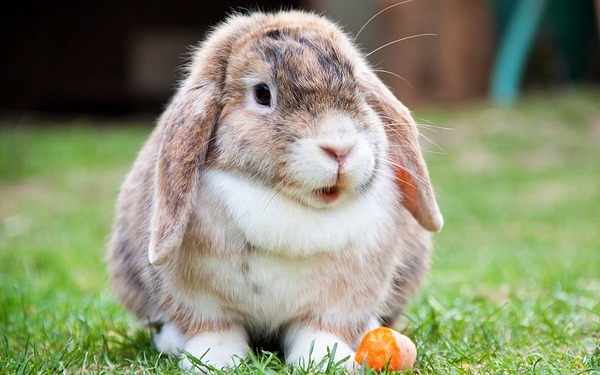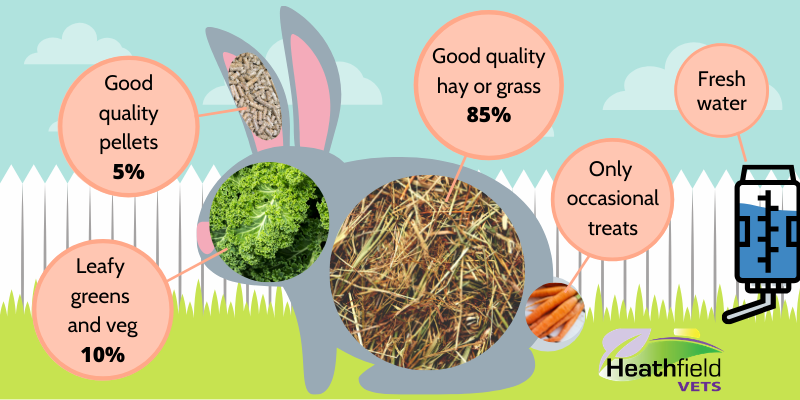
Rabbits are ‘hind gut fermenters’ that require a fibre-heavy diet. Having this specialised digestive system has its drawbacks. It is very efficient at processing low nutrient food like grass; however, the wrong types of food can throw the digestive system off balance.
Too little grass or hay slows the digestive process down as this helps to move food through the system.
Too much carbohydrate or protein can send the gut into overdrive and produce sticky, unformed faeces.
Try to match the diet as closely as possible to that of a wild rabbit. In the wild they would eat a large quantity of different grasses. The remaining part of the rabbit’s diet is a combination of other plant matter like dandelion, nettle and thistle. It may also consist of twigs and the occasional fruit or grain.
Components of a balanced diet
In order to feed a balanced diet, it needs to consist of around 85% hay/grass, 10% leafy greens and vegetables and 5% pellets. To put this into perspective, they need about their body size in hay, their head size of greens and about the size of an ear in pellets and treats.

Types of hay/grass
- Meadow
- Orchard
- Timothy
- Oat
- Alfalfa
Vegetables
- Stalks – celery, chard and broccoli
- Leaves – cabbage, spinach, carrot leaves, kale, cabbage leaves, blackberry and raspberry leaves, carrot and radish tops (these are best as they are low in calories and high in fibre)
- Flower bud – broccoli and cauliflower heads
- Herbs – parsley, rosemary, dill, sage, thyme, coriander and mint.
- Wild plants – dandelion, thistle, clover, chickweed, nettle and shepherd’s purse.
Only give a very small amount of root vegetables (carrot, parsnip, turnip, swede, beetroot) and fruit as they are high in sugar. Do not give lettuce as this contains lactucarium, a chemical harmful to rabbits. Other foods to avoid include:
- Bulbs – onion, leek and garlic
- Tubers – potato and yam
- Seeds – peas, beans, lentils and pulses
These types contain too much starch and can cause illness.
Dry Food
There are two main dry food types sold, muesli-style mixtures and pellets. The muesli generally is cereal based, and the pellets are grass based. Muesli is not recommended as it encourages selective feeding- where rabbits pick out the bits they want and avoid the more nutritious parts, meaning their diet isn’t balanced. It is also better to go with pellets as they are higher in fibre and lower in protein than the cereal based mixtures.
Teeth
Rabbit’s teeth are continuously growing so having a diet high in fibre will help to wear them down. You want to avoid them growing spurs as this is very painful and often, they will stop eating. This then puts them at risk of gut stasis, which can be life threatening.
Call us on 01435 864422 if you have any concerns about your rabbit’s health.

